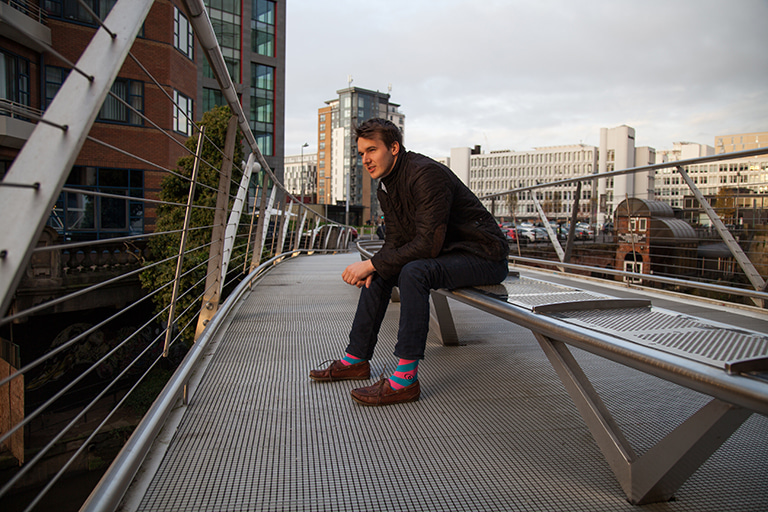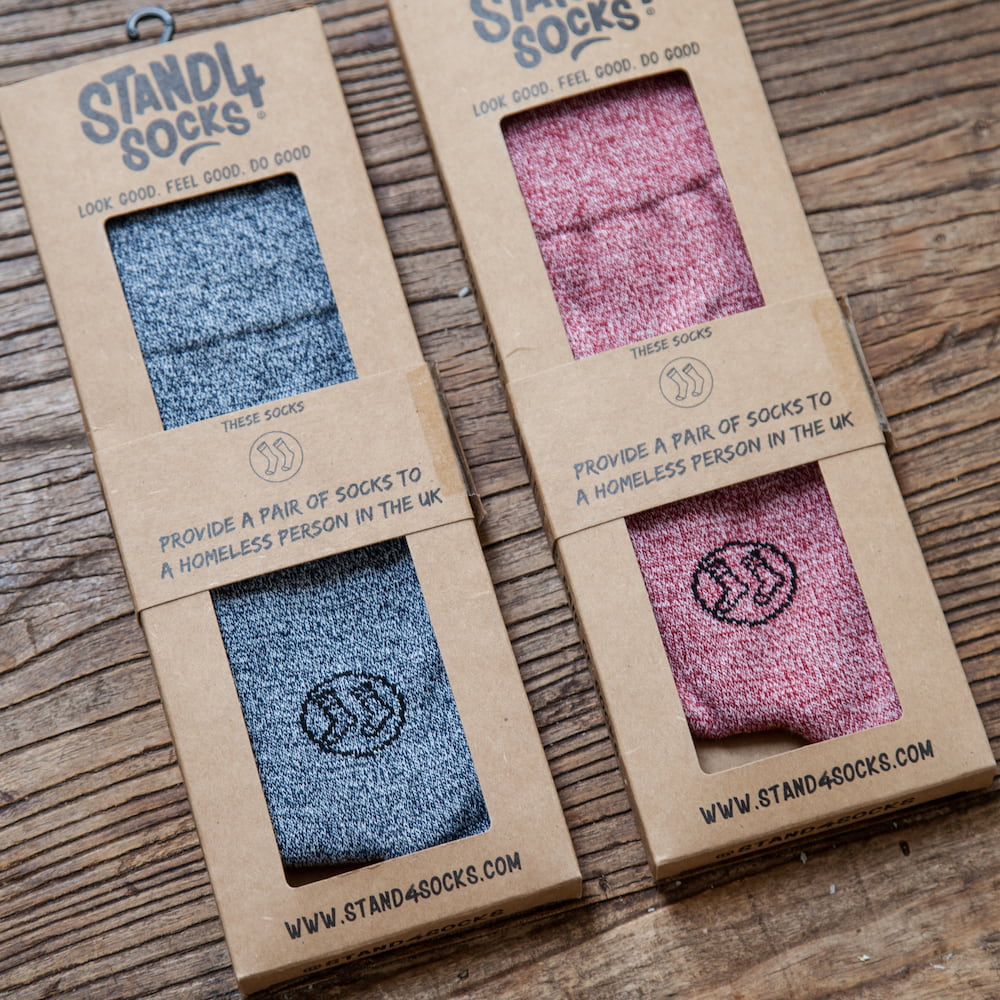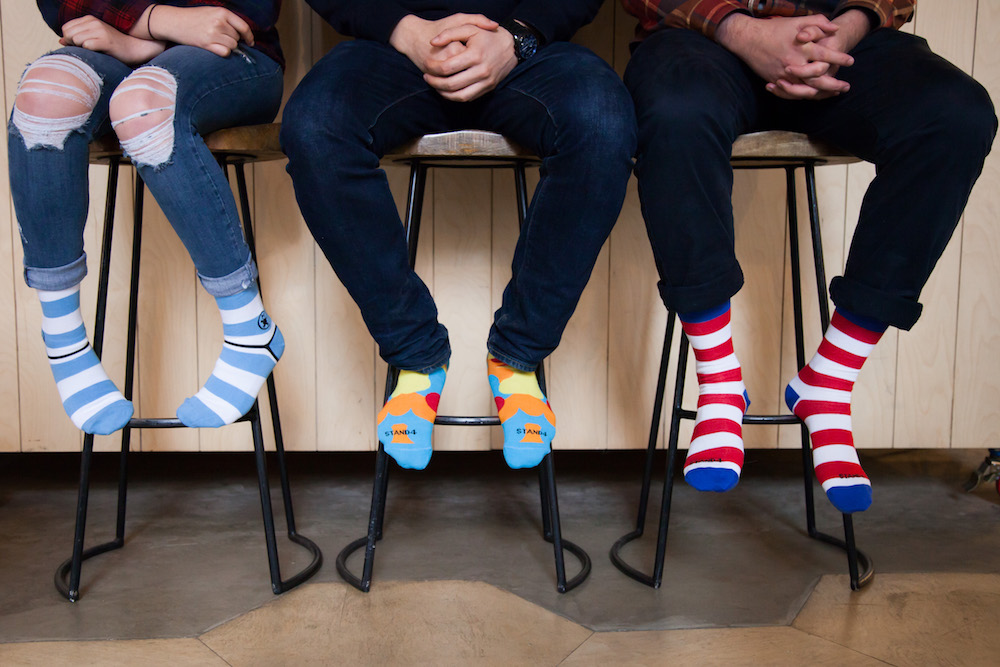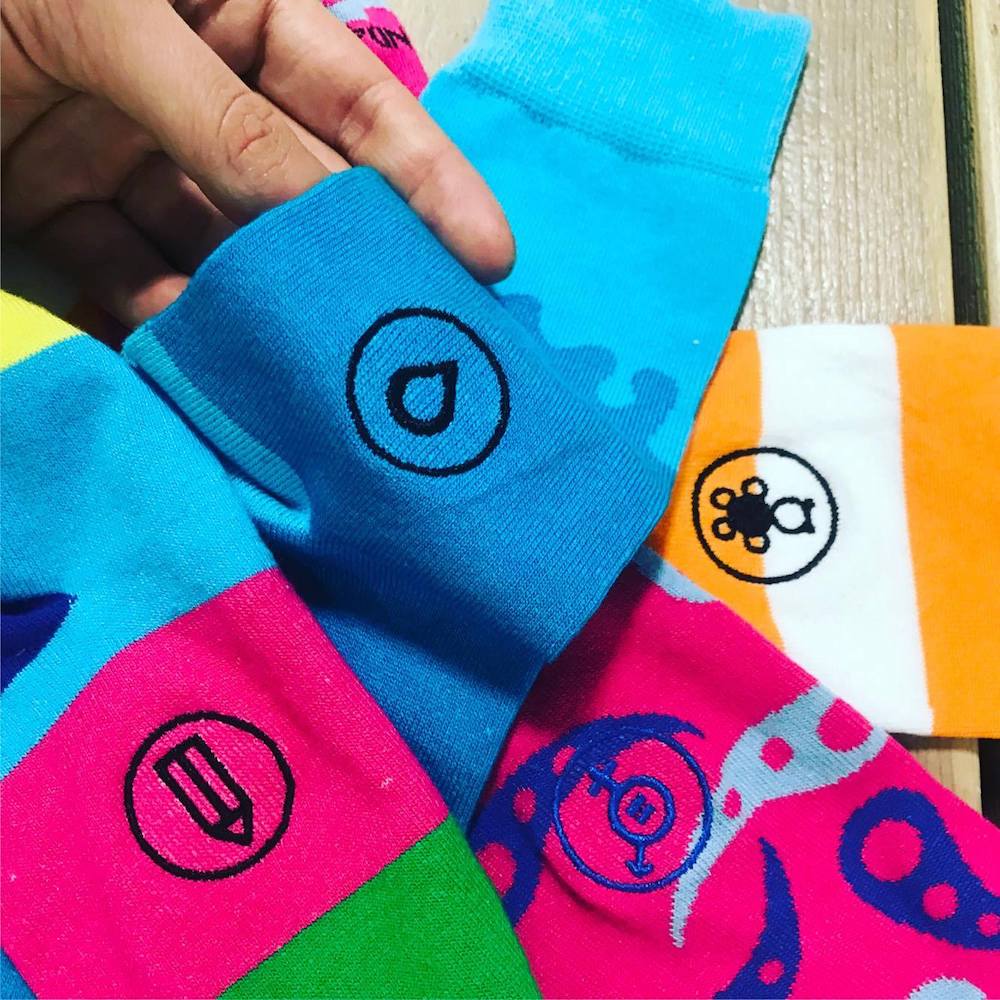Josh Turner has a vision to revolutionise the way we shop, by making everyday accessories a charitable commitment
Imagine if every time you bought a product, you were helping people around the world. Josh Turner, 26, is on a mission to make this dream a reality. The social entrepreneur started his Stand4 Socks business in 2015 using crowdfunding platform Indiegogo, and now, when people get dressed in the morning, their choice of socks means so much more than just the miracle of finding a matching pair.
Hello Josh! Have you always had a passion for business?
For as long as I can remember I’ve been entrepreneurial, but certainly since I was seven. I used to round up items from the house and sell them to family – a great business model!

My first dip into social entrepreneurship was when I was about 17. You know when you’re too cool to go to an under-18 night, but obviously not old enough to go to a normal club? There are only so many things you can do at that age, so we created club nights where you could have 16 and 17-year-olds in the same venue as 20-year-olds. The venue would have multiple rooms and you needed a wristband to go anywhere where there was alcohol.
Our first event was far too popular. We pre-sold most of the tickets and held 200 on the door, but in the end more than 1,200 people showed up for them. The police and riot vans came out! It was really chaotic, but also really successful from our point of view. At the time, I wasn’t thinking of it as a social enterprise. In reality though, there was a problem of antisocial behaviour where there weren’t enough activities for young people, and so we created something to solve that.
We want to create a world where every transaction, no matter how big or small, has a positive impact. If we can prove that socks can have a massive impact on the world, then anything can!
How did Stand4 Socks come about?
After my business management degree, I had this thought: “What if socks could change the world?” Among friends it was sort of a joke, but after talking about it a bit more, I was like: “Well everyone does need a pair of socks. What if every pair of socks could have a positive impact?” I was inspired by the Toms shoes model that says for every pair of shoes they sell, they give a pair. I’ve always loved bright, bold socks, and socks brands were starting to take off rather than being just an accessory. I thought: “Let’s take the buy-one-give-one model and apply it to socks.”
The Toms model is sometimes criticised for the fact that, yes, they give shoes, but are shoes the biggest need of the people they’re giving them to? They haven’t been vaccinated against measles; they haven’t got clean drinking water, among other things. We thought that giving socks was going to be even more pointless. So what if, we thought, our socks could be an expression of what someone stands for and what matters to them?
We wanted to align our socks as closely as possible to the United Nation’s Global Goals, with a tangible impact while also raising awareness. Back then, socks were dull, boring, poorly made items. We’re producing really high quality, ethically made socks. We’re trying to make the greatest socks in the world.
Imagine if every time you were using MasterCard or Visa, it was doing some good in the world. Social enterprise could become not a niche but the norm
How did you go about threading the vision together?
I’ll admit now, we were probably running a sock company for six months without having a sock manufacturer. Socks used to be really big in the UK, and they still have a presence today, just the niche, high quality type. Now, Turkey is the place innovating socks and bringing in new machines. I met our Turkish manufacturers at a Chamber of Commerce event in London. It took a lot of emails and a few trips to Istanbul to get them on board. It was when we were just chatting and stopped talking about socks that it started to work out.
I told them about my background, what I was trying to do, and they could relate because these brothers came into their father’s business, and had older people help them early on. What I’ve learnt is that doing business in Turkey is 80% relationship and 20% business. Now, a couple of years on, once a month we have lunch and dinners and talk everything but socks, really.

Our first order was 300 pairs and 10 different designs. They were like: “We’ll literally make no money on this at all, but we want to get you started.” They’ve loved to see it grow from this crazy guy with an idea, to appearing in newspapers. They keep saying: “If you can get one of the royals to wear our socks, we’ll frame it and put it in our factory.”
Do you consider yourself a businesssman first and foremost, or have you always wanted to make a difference?
Millennials are more likely to actively check packaging to see how products are made and their impact on the world, and want to work for companies that have a positive impact. I’ve very much always been of the opinion that the corporate social responsibility attitude of “making millions and giving a thousand back just for some good PR” has gone. I don’t think it was so much a conscious decision, it was more like, why wouldn’t I want to do this?
How do you fulfil the pledges?
It’s very complicated and different with each organisation. Some projects we prefund, so we go out and plant a certain number of trees, and in other cases it’s post-funding because of the cost-change. With War Child, we’re educating Syrian refugees, but the prices for that can change and there’s only so much we can write on packaging.
Tell us a bit about your UK-based, homeless pledge?
We only launched that last year, but it’s increasingly becoming more key. We pre-give out those socks. We weren’t going to wait and say: “We’ve sold 10, we’ll give out 10. Sorry, we need to sell another pair before you can have one.” We just started to give them out to homeless shelters and to people directly. It was such a change for us, as usually the causes are so far away. It’s nice to physically give out a pair of socks to somebody and them say thank you, which is always surprising to me because I’ve got a flat full of thousands of socks, but then I suddenly recognise how important socks are to someone.

Homelessness is something we’ve got more and more involved in and I think we will continue to do so. We realised a lot of people donate food and warm clothes, but not many donate socks. We want to give out 100,000 socks to homeless people by 1 January 2018. We’ve got a textile engineer with us at the moment to come up with the world’s best homeless sock. It could be made of antibacterial material so you could wear it for two to three weeks without washing it and it wouldn’t get smelly. You could wear it for eight to nine days and it wouldn’t rub on your feet.
We’re at a point now where we know enough about sock technology to be really innovative, and the manufacturer can come in with their 30 years’ experience in textiles, so we’re in a position where we can actually achieve something like this, where we couldn’t before.
Have you been able to visit these places where the money has gone to help?
Not yet, but we’d like to! As soon as, say hypothetically, a company buys 5,000 pairs all to provide clean water, suddenly we can go build a well and directly see the impact. We’re waiting for the moment when an organisation can align with a cause. At the moment, it’s good amounts but it’s also lots of small things. We need a big one where we can literally own a project and say: “This is what we’ve done.”

What are your plans for the future?
We want to create a world where every transaction, no matter how big or small, has a positive impact. If we can prove that socks can have a massive impact on the world, we can prove anything can!
We’re expanding into bamboo socks and kids’ socks, so there are loads of opportunities with them. The bigger idea is for an online platform where we can power traditional transactions and say: “If you buy from this retailer rather than this one, you plant 30 trees.” It’s the overarching idea that every transaction has a tangible, positive impact.
Finally, are you hoping that your model spreads beyond your own business?
Yes, 100%. We didn’t coin it at all, and I doubt even Toms shoes did. There are companies popping up who do it in all different kinds of products. I think it’s great to make the bigger guys think twice.
Imagine if someone made a football boot social enterprise and Nike and everyone had to think about making their supply chains ethical. Or imagine if every time you were using MasterCard or Visa, it was doing some good in the world. Social enterprise could become not a niche but the norm. Consumer spending is going to hit $40 trillion by 2020, and if just 1% of that has a positive impact, we’ll be able to solve so many social problems in the world.
To find out more about how Stand4 Socks are changing the world, visit Stand4Socks now.


Comments